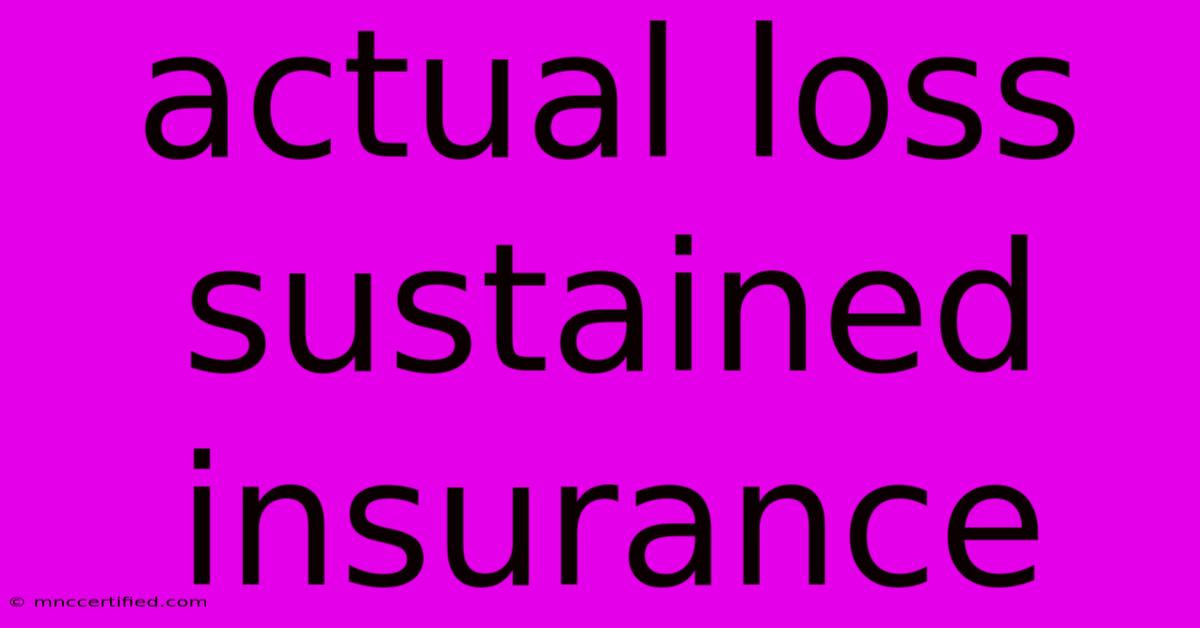Actual Loss Sustained Insurance

Table of Contents
Actual Loss Sustained: Understanding Your Insurance Coverage
Understanding your insurance policy, specifically what constitutes "actual loss sustained," is crucial for making a successful claim. This isn't simply about the initial cost of damage; it delves into a more nuanced assessment of your financial losses. This comprehensive guide will help you navigate the complexities of proving actual loss sustained in an insurance claim.
What Does "Actual Loss Sustained" Mean in Insurance?
"Actual loss sustained" refers to the real and demonstrable financial losses you've experienced due to a covered event, such as a fire, theft, or accident. It's not about estimated costs or potential future losses; it's about quantifiable financial harm directly resulting from the incident. Insurance companies use this term to ensure claims are legitimate and accurately reflect the financial impact on the policyholder.
Key Elements of Proving Actual Loss Sustained:
-
Direct Financial Losses: This includes costs directly related to repairing or replacing damaged property. For example, if a fire damages your home, this would encompass the cost of repairs, materials, and demolition if necessary. For a stolen item, it's the replacement cost or the item's fair market value at the time of theft.
-
Documentation is Paramount: You need robust evidence to support your claim. This includes receipts, invoices, repair estimates, police reports (in cases of theft or vandalism), and photographs of the damage. The more comprehensive your documentation, the stronger your case.
-
Indirect Losses (Potentially Covered): While the focus is on direct losses, certain indirect losses might also be covered depending on your policy. This could include:
- Loss of income: If the damage prevents you from working, you may have a claim for lost wages (often requiring specific policy riders).
- Temporary living expenses: If your home is uninhabitable due to damage, temporary accommodation costs might be covered. Again, check your policy specifics.
- Increased cost of living: In some cases, increased expenses related to the incident, like temporary housing, could be covered.
Common Challenges in Proving Actual Loss Sustained:
-
Determining Fair Market Value: For older or unique items, determining the fair market value can be challenging. Appraisals from qualified professionals can strengthen your claim significantly.
-
Insufficient Documentation: Lack of proper documentation is a major hurdle. Keep all relevant receipts and records in a safe place.
-
Policy Exclusions: Remember to carefully review your policy's exclusions. Certain types of damage or losses might not be covered, regardless of the actual loss sustained.
-
Delayed Claims: Reporting the loss promptly is crucial. Delays can complicate the claim process and impact the assessment of your actual loss.
Tips for Maximizing Your Claim:
- Act Quickly: Report the incident to your insurer immediately.
- Document Everything: Take detailed photos and videos of the damage. Gather all relevant receipts, invoices, and other supporting documentation.
- Get Multiple Quotes: Obtain quotes from several contractors or repair services to ensure you're getting a fair price.
- Keep Detailed Records: Maintain a meticulous record of all communication with your insurer.
- Consult with an Expert: If the claim is complex or involves significant losses, consider consulting with a public adjuster or insurance attorney.
Keyword Optimization:
This article incorporates various keywords related to "actual loss sustained insurance" such as: actual loss sustained, insurance claim, property damage, insurance coverage, proving loss, fair market value, documentation, insurance policy, loss of income, temporary living expenses, insurance adjuster, public adjuster. These keywords are used naturally throughout the text to improve search engine optimization (SEO) without compromising readability.
Off-Page SEO Strategies:
To further enhance the article's online presence, consider the following off-page SEO strategies:
- Link Building: Obtain high-quality backlinks from reputable websites in the insurance or legal fields.
- Social Media Promotion: Share the article on relevant social media platforms to increase visibility.
- Guest Blogging: Contribute guest posts to other insurance-related blogs to drive traffic back to your article.
By following these tips and understanding the complexities of "actual loss sustained," you can significantly improve your chances of a successful insurance claim. Remember, thorough documentation and prompt action are key.

Thank you for visiting our website wich cover about Actual Loss Sustained Insurance. We hope the information provided has been useful to you. Feel free to contact us if you have any questions or need further assistance. See you next time and dont miss to bookmark.
Featured Posts
-
Tms Therapy Cost With Insurance
Nov 25, 2024
-
Barton Mutual Insurance Reviews
Nov 25, 2024
-
What Is Ucr In Dental Insurance
Nov 25, 2024
-
Bayline Insurance Port Allegany
Nov 25, 2024
-
Small Business Insurance Garner
Nov 25, 2024